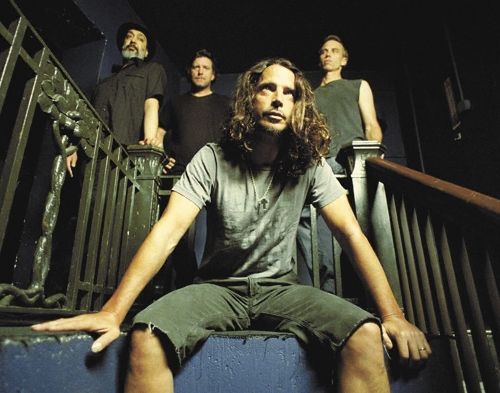Soundgarden, on tour after long hiatus, bringing their unique music to Las Vegas

Their sound is familiar and foreign, Apollonian and Dionysian all at once, a loud, chaotic collection of hard-rock tropes rendered as ductile as cookie dough.
This is Soundgarden’s high-wire act: balancing themselves between being proggy and populist, precise and impulsive simultaneously.
Guitarist Kim Thayil’s riffing can be traced back to the seismic rumble of Tony Iommi’s carved-from-stone power chords, but his soloing has always been wild and wayward, as untethered from its surroundings as a kite let loose in a stiff wind.
Frontman Chris Cornell possesses Robert Plant’s cochlea-imploding range, but he’s often more brooding than bombastic, favoring the shadows as much as the spotlight.
Bassist Ben Shepherd and drummer Matt Cameron lock in on rhythms with enough heft to crater concrete, but they’re often in the service of unorthodox time signatures and nonlinear jams.
All of this factors into why, two decades after the Seattle-spawned alt-rock boom of the ’90s, Soundgarden still remains a fixture on rock radio, and yet despite being one of the biggest bands of that era, they’re the group whose sound has remained the most singular and hardest to duplicate.
“We haven’t had too many imitators,” Thayil says. “There are so many dozens of bands that imitated or even outright ripped off Nirvana, but Nirvana’s a pretty easy band to imitate. There’s something wonderfully special about Nirvana — their songs, their performances, they’re amazing — but they’re not beyond duplication. I notice the same thing with Pearl Jam or Alice in Chains — you can see the bands out there who derive their inspiration from Seattle in general or a specific voice that Nirvana or Alice in Chains or Pearl Jam had.
“But I’ve never really seen that with Soundgarden,” he continues. “The bands that people have said sound similar to us, I just don’t see it. It’s like, ‘Really? There’s nothing about that song that sounds like us. It sounds like a commercialized version of a generic Seattle thing.’ There aren’t too many bands that can emulate Devo without obviously being devotees. You can’t do that with Sonic Youth, you can’t do that with the Ramones, and you can’t do that with Soundgarden. It just hasn’t happened.”
Something else that hasn’t happened much in the past decade-and-half: a Soundgarden tour.
In 1997, the band went on hiatus and only last spring reconvened to play together again.
“It was part burn out, but partly other opportunities, really,” Thayil says of the band members going their separate ways for a time. “There were other interests that everyone in the band had. In 13 years, you tend to like other music, and you grow in different directions, just as families do. Even though your mother and father wished that all of you became doctors, I’m sure that you and your siblings all took different career paths. That happened in the band.”
Thayil spent his time away from the band contributing as a studio musician on albums by a wide range of acts, from idiosyncratic pop rockers the Presidents of the United States of America to amp-worshipping drone merchants Sunn 0))) to Dave Grohl’s trad-metal side project Probot.
“I enjoyed doing that, because the commitment was minimal,” Thayil says. “I didn’t have to marry myself to a whole band, an organization and all the lawyers, accountants and managers that come with that. I had no interest in that. So I was able to do music, play on records and not have to engage in anything that would require the external organization to support it.”
Still, in the back of his mind, Thayil says that he knew Soundgarden would get back together again at some point.
“Without divulging conversations surrounding the band’s breakup, it was always shared and understood that some day we’d like to do another Soundgarden album,” he says. “We left that open, that some time in the future we’d like to write together and do a record together again.”
That record is still forthcoming, and the band won’t be playing any new songs on this round of dates.
But if their tunes haven’t changed, the same can’t be said for how they’re perceived by the dudes who wrote them.
“We may have understood the material to be somewhat spontaneous or perhaps an outwards yell, and now we realize there’s a nuanced character to the songs,” Thayil says. “There’s a different respect that you have for it now. There’s a certain reverence.”
Contact reporter Jason Bracelin at jbracelin@ reviewjournal.com or 702-383-0476.